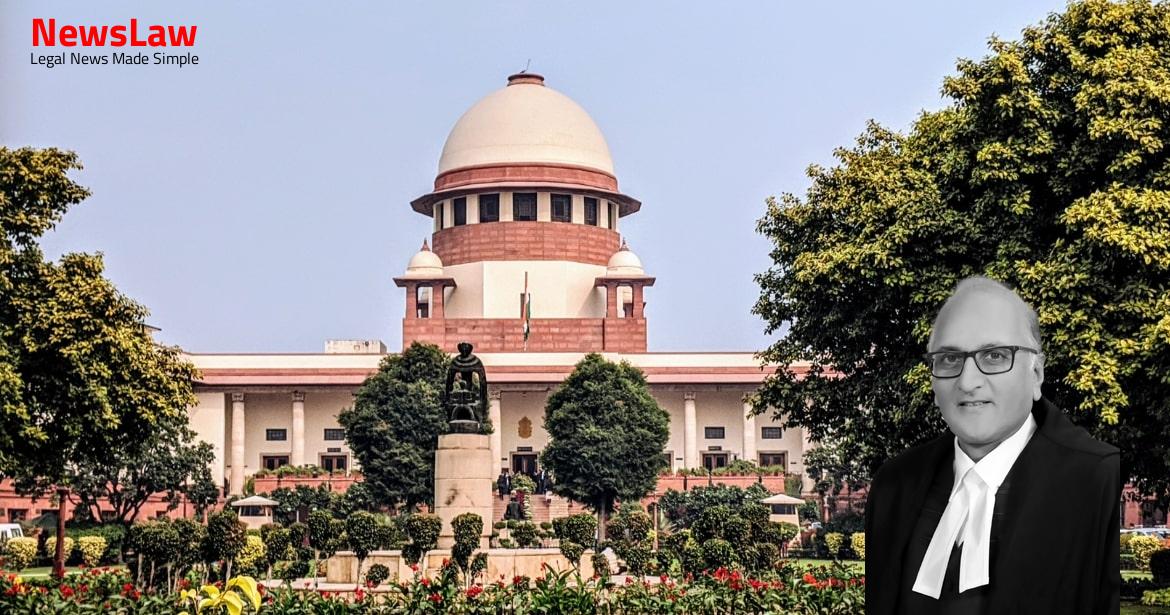In a recent legal case, the court delved into the intricacies of jurisdiction under Section 319 of the CrPC, emphasizing the need for a strong evidential basis before impleading accused persons. The court’s thorough analysis of the evidence and the criteria for invoking Section 319 offers valuable insights into the discretionary power vested in the judiciary. Legal practitioners and enthusiasts can glean important lessons from the court’s nuanced approach to the application of legal provisions in the case.
Facts
- The High Court granted the Complainant the liberty to prefer an application under Section 319 read with 216 of the CrPC before the Trial Court for impleadment of the Appellants in the proceedings from the FIR.
- The present appeal is filed by the Appellants against the Madras High Court’s decision setting aside the Trial Court’s order rejecting the application for summoning and impleading the Appellants as accused persons in connection with the case.
- The FIR was registered based on a complaint stating that the accused, accompanied by her husband and another person, physically assaulted the Complainant’s son and threatened her.
- A chargesheet was filed against the accused under relevant sections of the IPC, and the charge was later altered.
- The Trial Court partly allowed the application to implead Appellant No. 1 but rejected the same for Appellant No. 2 citing lack of attributions in the FIR.
- An application for re-investigation was filed before the High Court, where for the first time specific roles were attributed to Appellant No. 1 and Appellant No. 2 in the alleged incident.
- The High Court directed the Trial Court to consider the application under Section 319 read with 216 of the CrPC and implead the Appellants if necessary during witness examination.
- Witnesses and the doctor only named and ascribed a role to Respondent No. 3 in their statements before the investigating authorities.
- High Court observed that Trial Court must have a prima facie satisfaction of the accused committing the alleged offence before invoking Section 319 CrPC
- High Court allowed the criminal revision petition, set aside the Underlying Order, and directed the Trial Court to re-consider the case
- Application under Section(s) 319 read with 216 of the CrPC was filed by the Complainant, stating the omission of Appellants’ names in the FIR and the need to include them based on witness testimonies
- High Court allowed the revision petition on grounds of lack of notice to Appellants in the Underlying Application and remanded the case back to the Trial Court for fresh consideration
- Trial Court then dismissed the Underlying Application citing lack of evidence of Appellants’ involvement
- Complainant filed a criminal revision petition against the Underlying Order
- High Court, in the Impugned Order, noted allegations showing Appellants’ presence during the offence and trespassing into the Complainant’s home
Also Read: Balancing Private Grievances and Public Interests
Arguments
- Mr. S. Nagamuthu, senior counsel for the Appellants, argues that the High Court erred in reversing the Trial Court Order under Section 319 of the CrPC without considering the vague and omnibus nature of the allegations against the Appellants.
- The Appellants’ counsel contends that there is no evidence on record implicating the Appellants in the alleged offense.
- Reference is made to the decision in Hardeep Singh to support the argument that the power under Section 319 CrPC should be exercised sparingly and only when strong and cogent evidence exists against the accused.
- Counsel for the Respondents counter by stating that the High Court correctly assessed the evidence in the case which pointed towards the involvement of the Petitioners in the crime.
- The Respondents’ counsel relies on the judgment in Jitendra Nath Mishra to support the position that the Impugned Order was justified based on the evidentiary findings.
- The Court heard arguments from both sides and examined the materials on record in relation to the exercise of jurisdiction under Section 319 of the CrPC.
Also Read: Quashing of Criminal Proceedings Based on Insufficient Allegations
Analysis
- The High Court’s decision to implead the Appellants as accused persons was overturned by the Supreme Court.
- The Supreme Court emphasized that establishing a prima facie case requires strong evidence indicating near probability of the accused’s complicity.
- The Court stated that the evidence must be more than just prima facie, falling short of certainty of conviction if unrebutted.
- The power under Section 319 of the CrPC is discretionary and should be sparingly exercised based on the circumstances of the case.
- The High Court should have applied the test of more than prima facie evidence but less than certainty of conviction before impleading the Appellants.
- The Trial Court Order in the present case was well-reasoned and not perverse.
- The materials on record did not meet the threshold set in the Hardeep Singh case.
Also Read: Reversal of Acquittal: High Court Convicts Accused in Murder Case
Decision
- The appeal has been allowed and the Impugned Order has been set aside.
- The charge was found to be short of evidence that could lead to a conviction.
- The court found the evidence presented to be prima facie.
- Any pending application(s) have been disposed of by the court.
Case Title: N. MANOGAR Vs. THE INSPECTOR OF POLICE (2024 INSC 130)
Case Number: SLP(Crl) No.-008696 / 2021



